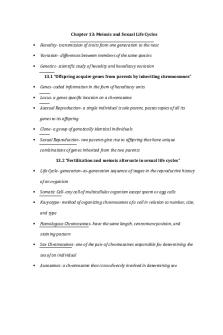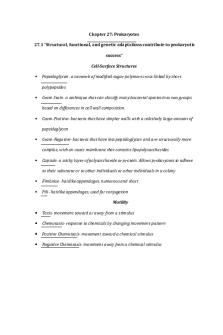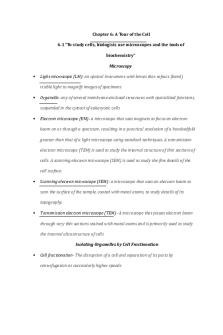Chapter 12 Vocab - Summary Campbell Biology PDF

| Title | Chapter 12 Vocab - Summary Campbell Biology |
|---|---|
| Course | Introduction to Biology A |
| Institution | University of Pennsylvania |
| Pages | 5 |
| File Size | 94.8 KB |
| File Type | |
| Total Downloads | 81 |
| Total Views | 158 |
Summary
Vocab definitions...
Description
Chapter 12: The Cell Cycle
Cell Division - the process in reproduction and growth by which a cell divides to form daughter cells 12.1 “Cell division results in genetically identical daughter cells”
Genome- the complete instructions for making an organism, consisting of all the genetic material in that organism's chromosomes
Chromosomes- a threadlike, gene-carrying structure found in the nucleus. Each chromosome consists of one very long DNA molecule and associated proteins.
Somatic Cells- any cell in multicellular organism except an egg or sperm
Gametes- reproductive cells, have only half the number of chromosomes as body cells
Chromatin- long strands of DNA found in the eukaryotic cell nucleus; condense to form chromosomes; the readily stainable substance of a cell nucleus consisting of DNA and RNA and various proteins
Sister Chromatids- identical copies of a chromosome; full sets of these are created during the S(DNA replication) subphase of interphase; two daughter strands of a replicated chromosome joined at the middle by a centromere
Centromere- a specialized condensed region of each chromosome that appears during mitosis where the chromatids are held together to form an X shape
Mitosis- cell division in which the nucleus divides into nuclei containing the same number of chromosomes; eukaryotic division
Cytokinesis- The final stage of the cell cycle, in which the cell's cytoplasm divides, distributing the organelles into each of the two new cells.
Meiosis- a process in cell division during which the number of chromosomes decreases to half the original number by two divisions of the nucleus, which results in the production of sex cells 12.2 “The mitotic phase alternates with interphase in the cell cycle”
Mitotic (M) Phase - The phase of the cell cycle that includes mitosis and cytokinesis; usually shortest part of the cell cycle
Interphase- cell grows, performs its normal functions, and prepares for division; consists of G1, S, and G2 phases; accounts for 90% of the cycle
G1 Phase- The first growth phase of the cell cycle, consisting of the portion of interphase before DNA synthesis begins.
S Phase- The synthesis phase of the cell cycle; the portion of interphase during which DNA is replicated.
G2 Phase- The second growth phase of the cell cycle, consisting of the portion of interphase after DNA synthesis occurs; stage of interphase in which cell duplicates its cytosol and organelles
Prophase- first and longest phase of mitosis, during which the chromosomes become visible and the centrioles separate and take up positions on the opposite sides of the nucleus
Prometaphase - The second stage of mitosis, in which discrete chromosomes consisting of identical sister chromatids appear, the nuclear envelope fragments, and the spindle microtubules attach to the kinetochores of the chromosomes.
Metaphase- the second stage in mitosis or meiosis in which the duplicated chromosomes line up along the equatorial plate of the spindle
Anaphase- the third phase of mitosis, during which the chromosome pairs separate and move toward opposite poles
Telophase- the fourth and final stage of mitosis or meiosis, during which a nuclear membrane forms around each set of new chromosomes; the final stage of meiosis when the chromosomes move toward opposite ends of the nuclear spindle
Mitotic Spindle- Spindle-shaped structures formed form microtubules and associated proteins that is involved in the movement of chromosomes during mitosis and meiosis
Centrosome - Material present in the cytoplasm of all eukaryotic cells, important during cell division; the microtubule-organizing center.
Aster- A radial array of short microtubules that extends from each centrosome toward the plasma membrane in an animal cell undergoing mitosis.
Kinetochore- a specialized condensed region of each chromosome that appears during mitosis where the chromatids are held together to form an X shape; a structure of proteins assoicated with specific sections of chromosomal DNA at the centromere
Metaphase Plate- An imaginary plane during metaphase in which the centromeres of all the duplicated chromosomes are located midway between the two poles
Cleavage- The process of cytokinesis in animal cells, characterized by pinching of the plasma membrane; specifically, the succession of rapid cell divisions without growth during early embryonic development that converts the zygote into a ball of cells.
Cleavage Furrow- The first sign of cleavage in an animal cell; a shallow groove in the cell surface near the old metaphase plate.
Cell Plate- the precursor of a new plant cell wall that forms during cell division and divides a cell into two
Binary Fission - a form of asexual reproduction in single-celled organisms by which one cell divides into two cells of the same size
Origin Of Replication - The specific location on a DNA strand where replication begins. Prokaryotes typically have a single origin of replication, while eukaryotes have several per chromosome. 12.3 “The cell cycle is regulated by a molecular control system”
Cell Cycle Control System- A cyclically operating set of molecules in the cell that triggers and coordinates key events in the cell cycle.
Checkpoint- A critical control point in the cell cycle where stop and go-ahead signals can regulate the cycle.
G0 Phase- a non dividing face of the cell cycle consisting of the portion of interphase before DNA synthesis begins
Cyclin- one of a family of closely related proteins that regulate the cell cycle in eukaryotic cells; a protein that attaches to kinases and makes the cell clock and kinases function efficiently by working in conjunction with them.
Kinases- an enzyme that activates or inactivates other proteins by phosphorylating them
Cyclin-Dependent Kinases - enzyme to which cyclin binds during interphase and mitosis, triggering and controlling activities during the cell cycle (Cdks)
MPF- Maturation-promoting factor (M-phase-promoting factor); a protein complex required for a cell to progress from late interphase to mitosis. The active form consists of cyclin and a protein kinase.
Growth Factor - one of a group of external regulatory proteins that stimulate the growth and division of cells
Density -Dependent Inhibition - The phenomenon observed in normal animal cells that causes them to stop dividing when they become crowded
Anchorage Dependence- The requirement that to divide, a cell must be attached to the substratum, such as the inside of a culture jar of the extracellular matrix of a tissue
Transformation- (1) The conversion of a normal animal cell to a cancerous cell. (2) A change in genotype and phenotype due to the assimilation of external DNA by a cell.
Benign Tumor - A mass of abnormal cells that remains at the site of origin.
Malignant Tumor- a tumor that is malignant and tends to spread to other parts of the body; a cancerous tumor that is invasive enough to impair the functions of one or more organs
Metastasis- spread of cancer cells beyond their original site in the body...
Similar Free PDFs

Ch26 - Summary Campbell Biology
- 6 Pages
Popular Institutions
- Tinajero National High School - Annex
- Politeknik Caltex Riau
- Yokohama City University
- SGT University
- University of Al-Qadisiyah
- Divine Word College of Vigan
- Techniek College Rotterdam
- Universidade de Santiago
- Universiti Teknologi MARA Cawangan Johor Kampus Pasir Gudang
- Poltekkes Kemenkes Yogyakarta
- Baguio City National High School
- Colegio san marcos
- preparatoria uno
- Centro de Bachillerato Tecnológico Industrial y de Servicios No. 107
- Dalian Maritime University
- Quang Trung Secondary School
- Colegio Tecnológico en Informática
- Corporación Regional de Educación Superior
- Grupo CEDVA
- Dar Al Uloom University
- Centro de Estudios Preuniversitarios de la Universidad Nacional de Ingeniería
- 上智大学
- Aakash International School, Nuna Majara
- San Felipe Neri Catholic School
- Kang Chiao International School - New Taipei City
- Misamis Occidental National High School
- Institución Educativa Escuela Normal Juan Ladrilleros
- Kolehiyo ng Pantukan
- Batanes State College
- Instituto Continental
- Sekolah Menengah Kejuruan Kesehatan Kaltara (Tarakan)
- Colegio de La Inmaculada Concepcion - Cebu














